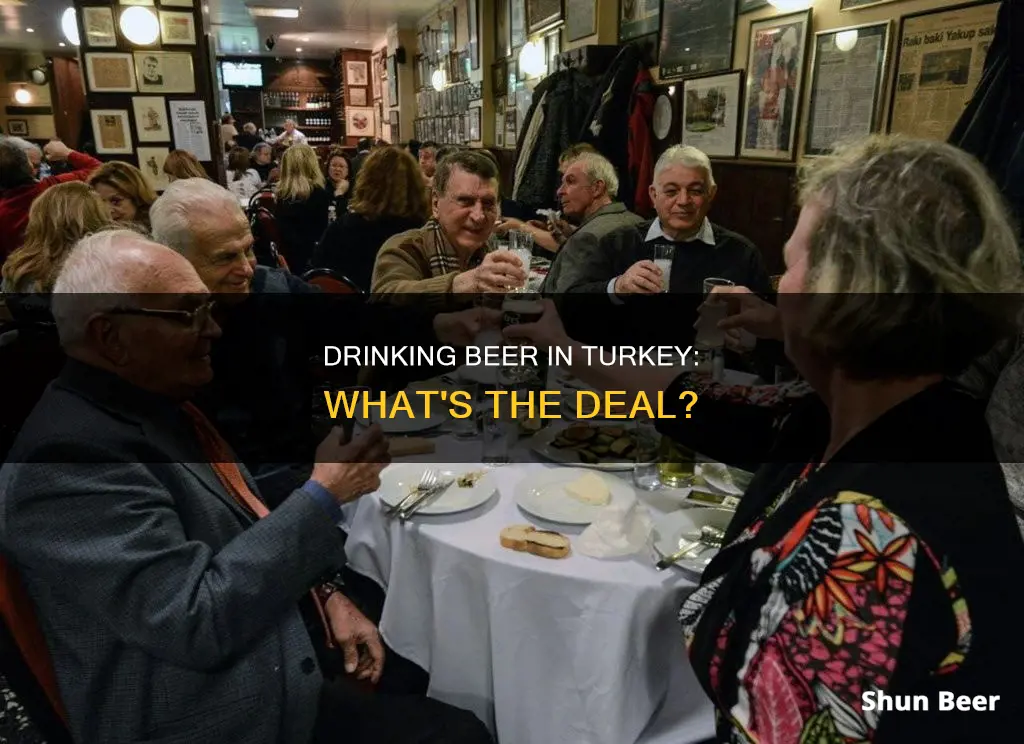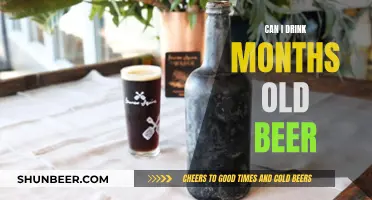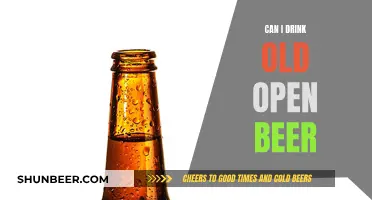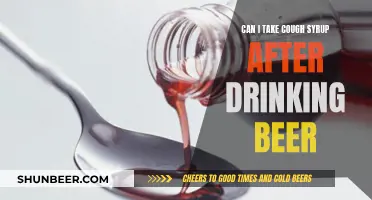
Alcohol is legal and consumed in Turkey, despite the majority of the population being Muslim. Drinking is a significant part of Turkish culture and cuisine in some regions, and alcoholic drinks are widely consumed by the Turkish people. The national drink of Turkey is Rakı, a spirit distilled from grapes and made with aniseed, similar to Greek ouzo. Beer is also commonly consumed, with Turkish beers including Efes Pilsen, Bomonti, and Marmara34. Drinking laws in Turkey include a ban on the sale of alcohol in shops between 10 pm and 6 am, and a blood alcohol limit of 0.05 mg/ml for drivers.
| Characteristics | Values |
|---|---|
| Is drinking beer legal in Turkey? | Yes, drinking beer is legal in Turkey. |
| Is drinking beer common in Turkey? | Drinking is a rich part of Turkish culture and cuisine in some regions, but there is also a large portion of Turkish people who do not drink alcohol for religious reasons. |
| Where can you buy beer in Turkey? | Beer can be purchased in corner stores called "tekel", supermarkets, restaurants, bars, and hotels. |
| When can you buy beer in Turkey? | Beer can be purchased from shops between 6 am and 10 pm. There is no time limit for purchasing beer in restaurants, bars, and hotels. |
| Who can buy beer in Turkey? | The legal drinking age in Turkey is 18 years old. |
What You'll Learn

Drinking laws in Turkey
The sale of alcohol in Turkey is restricted by time of day. Alcohol can be sold in markets only between 6 am and 10 pm, but there is no time limit for restaurants, bars, and hotels. Student dormitories, health institutions, sports clubs, education institutions, and filling stations are prohibited from selling alcohol. Alcohol cannot be sold within 100 meters of a mosque or school.
The legal drinking age in Turkey is 18, and the legal blood alcohol content limit for driving is 0.05%, with a zero-tolerance policy for commercial drivers. Drunk driving laws are strictly enforced, with police able to administer random alcohol tests on drivers at any time. If caught driving over the limit, offenders will face a hefty fine and a minimum six-month driving ban.
Advertising and promotion of alcoholic beverages are heavily restricted. Most forms of advertising on radio and television are banned, including the promotion of related sponsored activities, festivals, and giveaways. Alcohol must be blurred in television shows and films, and bottles must carry health warning labels.
Turkey is a secular country, but President Recep Tayyip Erdogan has been accused of pushing an Islamist agenda by stepping up restrictions on alcohol. During the COVID-19 pandemic, the government imposed a three-week nationwide lockdown and ban on alcohol sales through the end of Ramadan, which some saw as a ploy to reverse secularism.
Beer and Diabetes: Is It Safe to Drink?
You may want to see also

Where to buy beer in Turkey
Alcohol laws in Turkey regulate the sale and consumption of alcoholic beverages, and while it is a secular country, the majority of the population is Muslim, and 83% are teetotal. So, while drinking alcohol is not uncommon, it is not as popular as in other countries, and there are some restrictions on where and when it can be purchased.
If you are looking to buy beer in Turkey, you will need to be 18 or over and head to a licensed vendor. Beer is sold in markets between 6 am and 10 pm, but there is no time limit on sales in restaurants and bars. Student dormitories, health institutions, sports clubs, education institutions, and filling stations are prohibited from selling alcohol.
The most popular beer in Turkey is the Pilsner-style lager produced by Efes, which has around 80% of the market share. It is widely available in shops and restaurants and has an alcohol content of around 5%. You can also find Efes Dark, Dark Brown, Extra, Gluten-Free, and Draft. Some shops also sell Marmara, a cheaper alternative to Efes.
If you are looking for something different, there are other beers available, such as Tuborg, Bomonti, and Gara Guzu. Tuborg is the second most popular beer in Turkey, but it cannot capture the market share of Efes. Bomonti is the oldest Turkish beer brand, and it is known for its no-sugar, 100% malt brewing. Gara Guzu is a craft beer with eight flavours, including blonde ale, amber ale, red ale, and sour. It is mainly sold in Istanbul and is rare in smaller towns.
For a wider selection of craft and imported beers, head to Istanbul and visit the well-known pubs and breweries. Some of the beers that are harder to find but worth trying include Graf, Bosphorus, Torch, Pablo, Taps, Feliz Kolpa, and Khoffner. You can also find imported beers such as Budweiser and Desperado.
If you want to try a range of beers, Sir Winston's Pub and Bar is a good option, with its tagline, "life is too short to drink bad beer." They offer a range of regular, well-known, and lesser-known bottled and draught beers, along with an extensive menu.
UTI and Beer: Is It Safe to Drink?
You may want to see also

Drinking culture in Turkey
Turkey is a secular country, but the majority of its population is Muslim, which means that alcohol consumption is frowned upon and forbidden. Despite this, drinking alcohol in public and in private is not uncommon. The national drink of Turkey is Rakı (Rakija), a strong aniseed-based spirit that is usually consumed with a meal of fish, and accompanied by melon and white cheese.
Raki is typically served in small bottles, similar to how vodka is served in America. It is not drunk straight, but is instead mixed with water, which turns it a milky white colour. The ratio of Raki to water is usually one to one, but it can be diluted further if that is too strong. Raki has a strong taste and smell of black liquorice. There is an etiquette to drinking Raki that depends on the relationship with the person you are drinking with. If you consider them to be above you, such as your father or boss, then your glass should be lower than theirs when you toast. If you consider yourselves to be equals, then the glasses should be level. If the person is below you, such as a student or employee, then your glass should be higher than theirs, but it is up to them to lower their glass as a sign of respect.
Raki is usually consumed during serious conversations or discussions, such as the death of a relative. It is also the go-to spirit for a celebration. It is considered unusual for a Turk to drink alcohol without eating at the same time. Raki is drunk with friends and family, and is often served in taverns and restaurants for special occasions. The ritual of drinking Raki is centred around the raki table, where conversation is considered the best meze (appetiser) for Raki.
Alcohol consumption in Turkey is just above 1.5 litres per person per year, which is the lowest percentage in Europe. 83% of Turks are teetotal. Alcohol can be sold in markets between 6 am and 10 pm, but there is no time limit on sales in restaurants and bars. A license is required to sell or serve alcohol, and student dormitories, health institutions, sports clubs, education institutions and filling stations are prohibited from selling alcohol.
Beer and Creatine: Mixing Alcohol and Supplements
You may want to see also

Driving under the influence in Turkey
Drinking and driving in Turkey can result in serious penalties. The country has a zero-tolerance policy for driving under the influence of alcohol, with a blood alcohol limit of 0% for drivers towing caravans or trailers, and 0.05% for drivers of private cars. These limits are lower than those in England, Wales, and Northern Ireland, but the same as in Scotland.
Turkey has strict laws regarding drinking and driving, and drivers suspected of being under the influence of alcohol may be required to take a breathalyser test. The penalties for violating these laws include fines and license suspension, which can start at €141 for a first offence.
In addition to the legal consequences, driving under the influence of alcohol is extremely dangerous and can lead to accidents, injuries, and even fatalities. As such, it is important to refrain from drinking and driving, not only in Turkey but in all countries.
When driving in Turkey, it is also important to be aware of the country's unique driving culture and road rules. Turkey has a variety of roads, ranging from single-lane highways to modern motorways, and driving conditions can be chaotic, with frequent disregard for traffic rules such as running red lights or making abrupt lane changes. As a visitor, it is advisable to adopt a defensive driving approach and be prepared for encounters with aggressive drivers.
Overall, while drinking and driving in Turkey is illegal and can result in serious consequences, the country offers a unique driving experience with its diverse roads and landscapes. However, it is crucial to abide by the local laws and stay safe on the roads.
Beer After a Colonoscopy: What You Need to Know
You may want to see also

Drinking in public in Turkey
Turkey has a rich cultural heritage and a diverse population, with a significant Muslim majority. As a secular country, it allows the consumption of alcohol, and drinking is an integral part of Turkish culture and cuisine in some regions. However, there is also a growing trend towards Islamization, which has influenced alcohol policies.
The sale and consumption of alcohol are regulated by time and location. Alcohol can be purchased from shops only between 6 am and 10 pm, but there is no time restriction for bars, restaurants, and hotels. It is prohibited from being sold within 100 meters of a mosque or school, and certain places like student dormitories, health institutions, sports clubs, education institutions, and filling stations are not allowed to sell alcohol. These regulations reflect the country's attempt to balance its secular nature with the religious beliefs of its majority Muslim population.
Drinking in public places, such as streets, parks, or beaches, may be permitted depending on the city and municipality. While the law against public drinking exists, it is not always strictly enforced in tourist areas. However, it is essential to be respectful of local customs and traditions. Turkey has a social drinking culture, and it is considered impolite to refuse a drink when offered. Nevertheless, excessive binge drinking is frowned upon, and alcoholic beverages are typically accompanied by small finger foods.
The legal drinking age in Turkey is 18, and proper identification may be required when purchasing alcohol. Drunk driving laws are stringent, with a blood alcohol content limit of 0.05 mg/ml for regular drivers and zero tolerance for commercial drivers. Violation of these laws can result in hefty fines and driving bans.
In recent years, the Turkish government has imposed restrictions on alcohol sales, such as during the COVID-19 lockdown and the holy month of Ramadan. These actions reflect the government's push towards an Islamist agenda and have sparked debates about the country's secularism.
In conclusion, while drinking in public in Turkey is legal, it is crucial to be mindful of the cultural and religious sensitivities surrounding alcohol consumption. Respecting local customs, drinking responsibly, and adhering to the regulations regarding the sale and consumption of alcohol are essential when visiting Turkey.
Cholesterol and Beer: How Much is Too Much?
You may want to see also
Frequently asked questions
Yes, drinking beer in Turkey is legal, but there are some regulations and cultural norms to be aware of.
Alcohol sales are prohibited in supermarkets after 10 pm, but there are no time restrictions for bars, restaurants, and hotels. The legal drinking age is 18, and drunk driving laws are strict. It is illegal to sell alcohol within 100 meters of a mosque or school, and drinking in public spaces may be prohibited by the city governor.
While drinking is a rich part of Turkish culture in some regions, a large portion of the population does not drink alcohol for religious reasons. Local attitudes shy away from excessive drinking, and alcoholic beverages are typically served with small finger foods.
Beer can be purchased in corner stores, supermarkets, bars, and restaurants. In larger cities like Istanbul, Ankara, or Izmir, you should have no problem finding a drink, but in smaller towns or more conservative neighbourhoods, you may find restaurants that do not serve alcohol.







